Labour holds Calderdale in South Penninespublished at 15:11 BST 3 May 2024
 Image source, .
Image source, .We can also report that Labour has retained Calderdale Council in the South Pennines.
Labour has won key councils and regional mayors in England, with the Conservatives losing 10 councils and more than 400 councillors
It also picked up the new regional mayor for York and North Yorkshire - which covers Rishi Sunak's constituency
Ben Houchen's win in the Tees Valley mayoral race was a bright spot on what has been a bad set of results for the Tories
Rishi Sunak said losses were "disappointing" but mayoral contests like Tees Valley were a "key battleground"
Labour made gains, winning councils in Redditch, Thurrock, Hartlepool, and Rushmoor in Hampshire - but lost Oldham to no overall control
Labour also won the Blackpool South by-election, taking the seat from the Tories, with a 26% swing
Sir Keir Starmer said the result "sends a message" to Rishi Sunak, and called on the prime minister to "make way"
Edited by Alex Therrien and Sam Hancock
 Image source, .
Image source, .We can also report that Labour has retained Calderdale Council in the South Pennines.
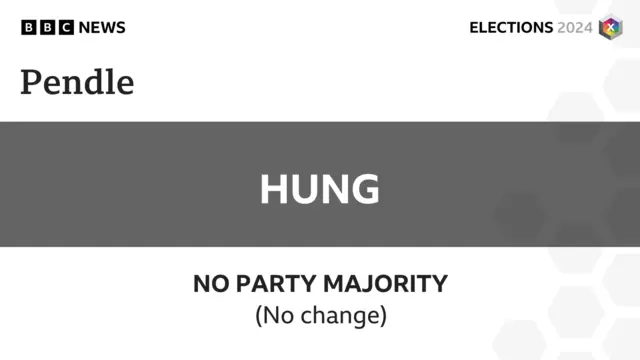 Image source, .
Image source, .Another result just in: Pendle Borough Council in Lancashire remains under no overall control as no party has won an outright majority there.
 Image source, .
Image source, .The Lib Dems have held Three Rivers District Council in Hertfordshire, results show.
Oscar Bentley
BBC Political Research Unit
The BBC is now forecasting that Labour will gain control of Milton Keynes.
Milton Keynes is a bit of a bellwether - both parliamentary constituencies typically follow national trends. Labour will take winning the council as a good sign for the general election, where both seats are must-win targets.
Milton Keynes City Council has been hung for the last 20 years - and Labour hasn't won a majority there since 1999. However, Labour only needed to gain two seats to take control of the council so it really wasn’t much of a challenge for them to win (and would have been very disappointing to not have done).
Rishi Sunak has made a brief appearance alongside the newly re-elected Teesside mayor Ben Houchen.
Speaking to supporters, Rishi Sunak says Labour "threw everything" at this election but "they couldn't dislodge Ben".
He says Houchen delivered more in seven years than Labour did in 30 years.
"I have a message to the Labour party - they know that they have to win here in order to win at the general elections - they assume that Tees Valley would stroll back to them but it didn't. People knew that they couldn't be taken for granted," Sunak says.
"They stuck with you in this election, and I know come the general election they ware going to stick with us too," the prime minister says, adding people here know that "it's the Conservatives that are building a brighter future for Britain".
 Image source, PA Media
Image source, PA MediaLord Ben Houchen with Prime Minister Rishi Sunak in Teesside following his re-election
Labour's David Skaith has won the York and North Yorkshire mayoral election and it's a blow to Rishi Sunak. The area covered by this mayoralty contains the prime minister's own constituency of Richmond.
Skaith secured about a third of the vote in an area previously considered a Conservative stronghold.
A Labour Party spokesman said the result was "truly historic", adding: "Keir Starmer's Labour Party is now winning in Rishi Sunak's backyard."
 Image source, .
Image source, .Labour has won control of Adur District Council from the Conservatives in West Sussex.
 Image source, .
Image source, .Labour has held Rochdale Borough Council in Greater Manchester.
That takes us over the halfway mark for council results in England, with 54 councils declared and 53 to go.
Labour’s David Skaith has won the race to become the York and North Yorkshire mayor.
This is another new mayoralty being contested for the first time and includes Rishi Sunak's constituency of Richmond (Yorks).
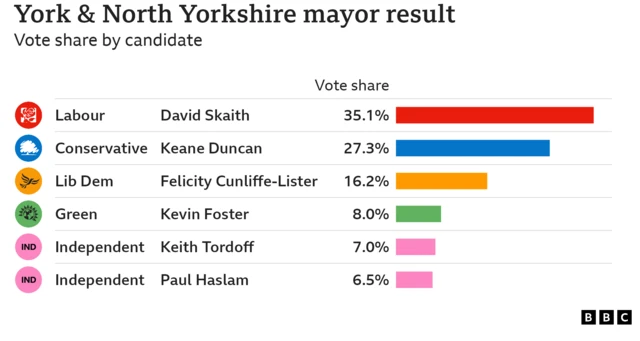 Image source, .
Image source, . Peter Saull
Peter Saull
Political Editor, BBC East Midlands
The declaration is expected shortly at the Nottingham Tennis Centre, but Labour has already called the East Midlands mayoral election for its candidate.
The party says that Claire Ward has beaten the Conservative Ben Bradley “comfortably”.
Labour is keen to talk up its result here, calling the East Midlands – which in this case comprises Nottinghamshire and Derbyshire – the “beating heart” of the general election battleground.
It is true to say that the two counties contain several key parliamentary constituencies – and had Sir Keir Starmer’s party not won here it would have caused a few jitters in Labour HQ.
Reform UK are also expected to have performed well here, adding to the Tories’ woes.
The Greens, too are hopeful of a strong showing.
Just like his counterparts in the West Midlands and Tees Valley, the Tory candidate Ben Bradley had urged voters to consider the person, rather than the party he represents.
But unlike Andy Street and Ben Houchen, the Mansfield MP isn’t an incumbent, and appears to have been swept away by the prevailing national political winds.
Counting has finished in Norwich - which remains under no overall control with no single party having a majority.
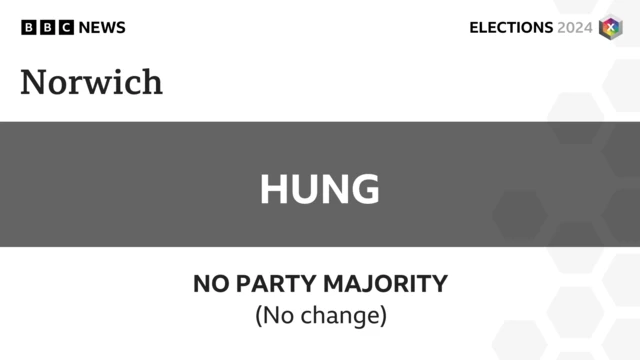 Image source, .
Image source, .Another council result now: the Conservatives have retained control of Walsall Council in the West Midlands.
 Image source, .
Image source, .The new mayor for the North East is Labour's Kim McGuinness.
She is the first to hold the newly-formed role, which covers Northumberland, Tyne and Wear, and County Durham - some two million people - and will have new powers devolved from Westminster.
She beat Jamie Driscoll, who won the North of Tyne mayoralty for Labour in 2019, but stood as an independent in this race.
As we mentioned earlier, the existing North of Tyne mayoralty will be absorbed into the larger North East mayoral role as part of the change.
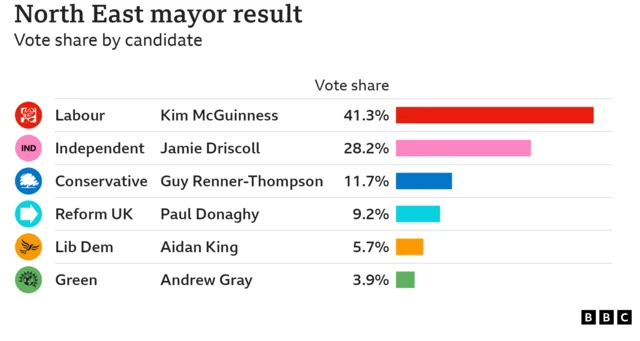 Image source, .
Image source, .Labour has held Halton Borough Council, in Cheshire, winning an additional seat from the Conservatives.
The change means Labour now has 50 seats, the Lib Dems three, and the Tories have one.
 Image source, .
Image source, . Simon Dedman
Simon Dedman
BBC Essex political reporter
It had a Conservative majority for two decades up until 2022.
The authority will now be entirely filled with local independent party councillors.
The Canvey Island Independent Party (CIIP) was the largest party before these local elections and took control in 2022 with the support from the People’s Independent Party (PIP).
But now PIP have a majority they don’t necessarily need to continue to work with the CIIP.
13 Conservative candidates had their nominations annulled in this year’s local elections in the borough due to admin errors by the local tory party.
 Image source, .
Image source, .Castle Point Borough Council, in Essex, has been won by the People's Independent Party.
Before these results came in, no party had an outright majority.

 Georgia Roberts
Georgia Roberts
BBC Scotland political correspondent
There haven’t been any elections in Scotland this time, so clearly these results have no direct impact north of the border.
But one thing the UK parties’ Scottish counterparts will be picking up on is the national mood.
Scottish Labour are drawing the parallels between these results and what it might mean for their chances of regaining swathes of Scotland from the SNP at the next General Election.
And it’s a national mood indicating a desire for change that they’re seeking to capitalise on here.
Like in Westminster, Scottish Labour are campaigning on a narrative of a government that’s tired, chaotic and out of ideas.
In Holyrood, that’s the SNP government; in power for going on two decades, and whose First Minister Humza Yousaf has just resigned over the chaotic fallout of his decision to end the SNP’s power sharing agreement with the Scottish Greens.
With a new first minister on the horizon, the SNP will be hoping for a reset and are confident they’ll recover.
But results today in England will give rise to hopes in UK Labour that Scotland too will pick up on a national mood that seems to be turning its back on the incumbent government – with Labour the chief beneficiaries.
David Deans
BBC Wales politics reporter
Two women have now been elected as police and crime commissioners in Wales, in a first in the country.
Emma Wools, who was deputy to her predecessor Alun Michael, has held the south Wales commissioner role for Labour.
As we reported earlier, Jane Mudd has been elected as police and crime commissioner in Gwent.
But as in other parts of Wales, turnout in south Wales region, which stretches from Swansea to Cardiff and much of the south Wales Valleys, was low at 16.58%.
Wales only held PCC elections on Thursday – the last local elections took place here in 2022 and there is no election to the Welsh Parliament until 2026.
Wools won with 73,128 votes, versus 43,344 for the Conservatives, 27,410 for Plaid Cymru and 17,908 for the Liberal Democrats.
The next big result we're expecting is from the North East mayoral election.
The winner will be the first to hold the role, and will speak for around two million people living in Northumberland, Tyne and Wear, and County Durham, and will have new powers devolved from Westminster.
The existing North of Tyne mayoralty will be absorbed into the larger North East mayoral role as part of the change.
All eyes will be on the impact caused by Jamie Driscoll, who won the North of Tyne mayoralty for Labour in 2019, but who is now standing as an independent in the race to be North East mayor, having quit the party after it decided against shortlisting him.
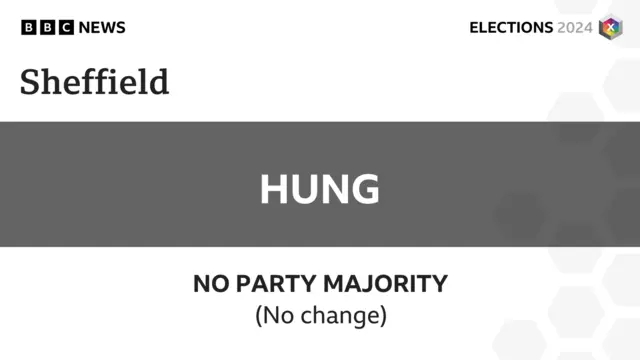 Image source, .
Image source, .More results coming in: No party has won an outright majority at Sheffield City Council, in South Yorkshire, so it remains under no overall control.